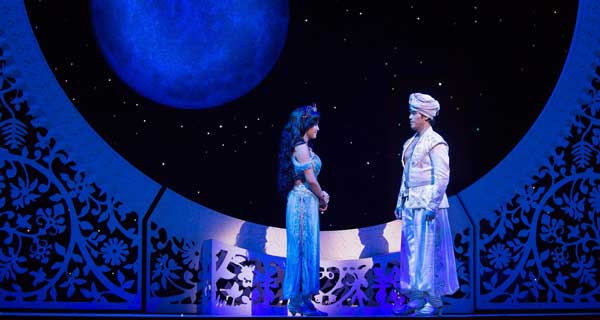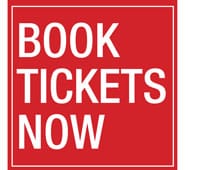
Disney’s Aladdin
New Amsterdam Theatre
15 April 2014
3 Stars
BOOK TICKETS
Sitting in the New Amsterdam Theatre at the interval of Aladdin, now having its premiere Broadway season, it was hard not to be fascinated and surprised by the conversation of other theatregoers. The ones speaking were mainly parents, looking earnestly at their children and asking them whether they thought it was “Ace”, “Tops”, “Hot” or “On It” (their words) and mostly they received shoulder-shrugs or a turned head or an IPhone being reactivated for answers. Each parent, though, pressed on – “But what about the tap number?” Blank stares were their only answer.
Ask me what I want from Aladdin and the first answer will always be: magic! Aladdin turns on magic. The three wishes from the Genie, the magic capable of transforming ordinary lives into something extraordinary, the ordinary carpet that flies.
Casey Nicholaw, who has directed and choreographed this version of the famous Disney film, understands magic and provides it here in excess. The first entrance of the Genie is astounding – he seems to melt upwards from underneath the cavern filled with glittering gold and gems into which the evil Jafar has dispatched the willing Aladdin. The combination of smoke from the lamp and a circular revolving trapdoor weaves remarkable magic. It is a bravura moment in the theatre and a triumph for Bob Crowley’s glorious designs.
There is magic too in the magic carpet ride. Not a wire in sight, just the lush carpet, Aladdin and Jasmine, the moon and the stars. And flying. The kind of flying you dream about as a child. It is spectacular to look at. Crowley again.
There is also magic elsewhere: the Genie’s trailer, the transformation of Jafar (twice) and, in quite a different way, in the genius spectacle that is Nicholaw’s stupendous staging of “Friend Like Me”.
Being the theatre, magic can come from unexpected quarters. But that doesn’t happen here. The magic is where you expect it to be, and, as a result, is not quite as magical as it might be.
Ask me what else I want from Aladdin and the answer will always be the same: a winning, charming Aladdin, a likeable rogue, a charming scallywag, a hopeless, silly dreamer who wants a better life. In a play full of magic, the leading man needs something special to shine through, to bind the proceedings together.
Adam Jacobs seems born to play Aladdin. He is physically perfect, just like a cartoon idealised hero, with perfect hair, a perfect torso, a perfect smile. He can sing and dance too. He understands now to charm an audience and does that most effectively. Until the Genie arrives and he is made to look starkly one-dimensional in comparison.
Jacobs is no more than a passable actor, and while that is fine here, it means that there is little chance for exceptional depth or, the ingredient chiefly missing from this production: heart. The fact is that no one really cares about Aladdin’s fate. This is more pantomime than musical theatre, more sketch comedy than book musical.
It seems to owe more to Book Of Mormon than to any of its Disney predecessors on Broadway: perhaps not surprisingly given Nicholaw co-directed and choreographed that piece. Each of Beauty and the Beast, Little Mermaid, Lion King, Tarzan and Mary Poppins played by the usual rules of musical theatre. They were narrative tales, played for real, with music and they rose or fell on the spectacle and now the audience loved and cheered for the heroes.
Aladdin breaks that mould. It plays to and through the fourth wall. It is full of in-jokes, references to other musicals (the Dreamgirls one is hilariously camp), sly witty modern double-entendres and bits of business which see the characters step out of character into some observer-commentator role. Some of this is undeniably funny, and clever, very clever often, but it serves to distance the audience from the heroic characters, to diminish their quests. To make them less loveable.
I did not notice anyone come even close to a gasp of joy, let alone a tear, when Jasmine and Aladdin finally kissed. In a show such as this, that seems incomprehensible.
Ask me what else I want from Aladdin and the answer will always be the same: a delicious, thoroughly vile villain. Jonathan Freeman, who so silkily and maliciously voiced the cartoon Jafar in the Disney movie, returns to the role here in the flesh. It is a catastrophic mistake because all Freeman brings to the role is the lush voice, and a stage villain needs much more than that.
Jafar is one of the great, completely evil, completely disgusting, completely selfish villains of the repertoire. He makes Snow White’s evil Queen look like Shirley Temple. He needs to be played with avuncular venom, with cunning and intriguing insight, with calm Richard III- esque viciousness, with electrifying style. A grand voice simply is not enough.
This is especially so in this weird self-reflecting self-parodying version of the narrative. Chad Beguelin’s book is all over the place, cramming in jokes and parody moments faster and more frequently than plot developments. So the style necessary to sustain the interest in the villain is especially refined, demandingly crisp, achingly necessary. Freeman is not up to the task.
Interestingly, though, his side-kick here, a new invention for this production, is one of the great joys of the evening. Iago, here played by Don Darryl Rivera, is genuinely surprising and funny. He makes obsequious excess and villain-in-training idiocy sublimely entertaining. He plays off the Jafar that should be there and improves Freeman with every scene.
Ask me what else I want from Aladdin and the answer will always the same: a funny, eccentric and fabulous Genie. The show can’t work without the Genie.
James Monroe Iglehart is a triumph. He wholeheartedly embraces the extremes of the Genie, the power, the glory, the gaudy, the camp, the heartbreak and the belief in goodness. As the one truly magical creature, of course, he can flit easily between the dual worlds of the narrative and the comedic commentary on the narrative. And at flitting, like singing and dancing, he shines. His comic timing is superb and the energy he expends is blissfully absorbed by the willing audience. He might pay more attention to the lyrics (over half of what he sings is not capable of being understood) but the ebullience and thrilling pleasure he generates makes that seem not to matter. You may not hear his words, but you understand everything he says and does.
The costume designs for the Genie are remarkable and Gregg Barnes really shines in his designs there. But then all of the costumes are delightful, spectacular and they entirely evoke the spirit and exotic location of the action. No one looks anything less than fabulous at all times – even Jafar when being sent to his prison looks like some desperate sequinned red-dressed Liza Minnelli clone, a parody of his earlier self. It’s a moment to savour; one of many the costumes here provide.
Overall, the ensemble are terrific. The boys must be in line for some Best Chests Of Broadway prize and the girls are sex personified in their fluttering harem outfits, their perfect belly buttons front and centre. All sing and dance exceptionally well and the greatest moments the production reaches are when the whole cast are dancing to Nicholaw’s beat – whether in the opening Arabian Nights, Prince Ali (the best ensemble number of the night) or the closing routines for both Acts.
The new music is good, but not in the league of the new songs added to the Broadway scores for Little Mermaid or Beauty and the Beast. Aladdin’s Proud Of Your Boy is pretty enough but it is the test-tube clone of Little Mermaid’s Part Of My World and so lacks any sense of real originality while seeming comfortable in the way old slippers are. Somebody’s Got Your Back is cheery enough, but it goes on for too long. The new orchestrations for Whole New World deprive it of the lush beauty and simplicity it once had.
As Jasmine, Courtney Reed is perfectly pretty, but that is about it. No actress and only an average singer, she does not make the part the pert, fiery goddess she should be. Still she is infinitely better than Clifton Davis who embarrasses as the Sultan (so appalling is his acting) or Jaz Sealy who is even worse as Prince Abdullah.
And the trio of Aladdin’s best buddies, Babkak, Omar and Kassim (Brian Gonzales, Jonathan Schwartz and Brandon O’Neill) are up and down, sometimes funny, sometimes manic, sometimes peculiar. The trio is a nice idea but the idea needs more work to yield proper fruit. Only Babkak and his running gag about mishearing food mentioned in conversation seems fully formed, comically ripe.
Reading this back, it seems all over the place. Fitting perhaps, because that is precisely now the show itself feels. Not quite one thing (a knowing self-parody) or another (a pantomime) but definitely not what was expected – an old-fashioned, but new, musical comedy.
It is sold out for some time and will do, no doubt, tremendous business. But if their parents’ urgings about the tap dancing (which was exceptional) is the lasting impression the show gives young folk, then it will pale into insignificance against its Disney Broadway forebears.
It need not have been so.
